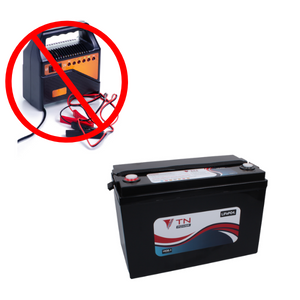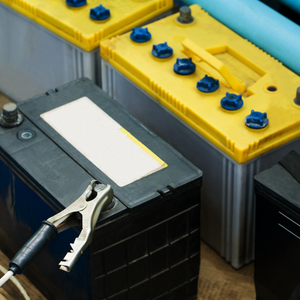Leisure Batteries FAQs
| Q | What does AGM stand for? |
| A | AGM stands for Absorbent Glass Mat. |
| Q | Why can't I just use a starter battery? |
| A | Starter batteries are designed in a way to favour high cranking capacity rather than recharge durability and small current draws. This means they become damaged by this type of usage and therefore do not last as long as dedicated leisure batteries. |
| Q | Why are LiFePO4 (lithium) batteries so expensive? |
| A | Lithium batteries are expensive because they can provide almost double the useable energy storage capacity when compared with an equivalent-sized lead-acid battery, they are around 50% lighter and have a much longer life span. We often find that customers who buy a lithium battery will save money in the long term as they will not need to buy a new battery as often and can save space in their installation. |
| Knowledge Centre Guides | Article Link |
|---|---|
Leisure Battery GuideDeep-Cycle Leisure batteries are the heart of your electrical setup, distributing power to all of your equipment. Different from vehicle starter (or cranking) batteries that deliver a large amount of current over a short period of time, deep-cycle batteries (also known as leisure batteries) are designed to deliver smaller amounts of current over long periods | |
Upgrading to Lithium BatteriesLithium batteries are becoming more popular in the leisure market and many people are looking to upgrade to this more efficient technology. In this guide, we will walk you through the basics of lithium batteries and look at what you will need to make sure your set-up is suitable for this upgrade...Read More | |
How Long Will A 12v Battery Last?We often get asked by our customers how long a 12v battery will last (both in terms of running time remaining until needing to recharge and the longer term useable lifespan), so in this article we run through some of the factors that determine this....Read More |
Featured News Articles
| Thursday, 16 June 2022 | Craig  We take a look at the problem of flat lithium batteries not charging and why it's happening. Posted in Help & Advice |
| Thursday, 20 January 2022 | Craig  A topic that often comes up during our conversations with customers is 'What is the lifetime of my battery?'. This can be a tricky figure to put a solid number on, however we are able to make an estimation as long as we account for differences in battery specification, type and usage. Posted in Help & Advice |
| Friday, 22 October 2021 | Craig  Today we will be reviewing our Lithium Batteries (LiFePO4) & how they compare to our more traditional AGM batteries. Our range of lithium batteries comes in 54, 84, 100, 110 & 216Ah capacities, providing a nice selection for your to choose from Posted in Product Reviews |
Disclaimer - The information contained in these articles is provided in good faith and we do our best to ensure that it is accurate and up to date, however, we cannot be held responsible for any damage or loss arising from the use or mis-use of this information or from any errors or omissions. The installer is ultimately responsible for the safety of the system so if you are in any doubt, please consult a qualified electrician.
